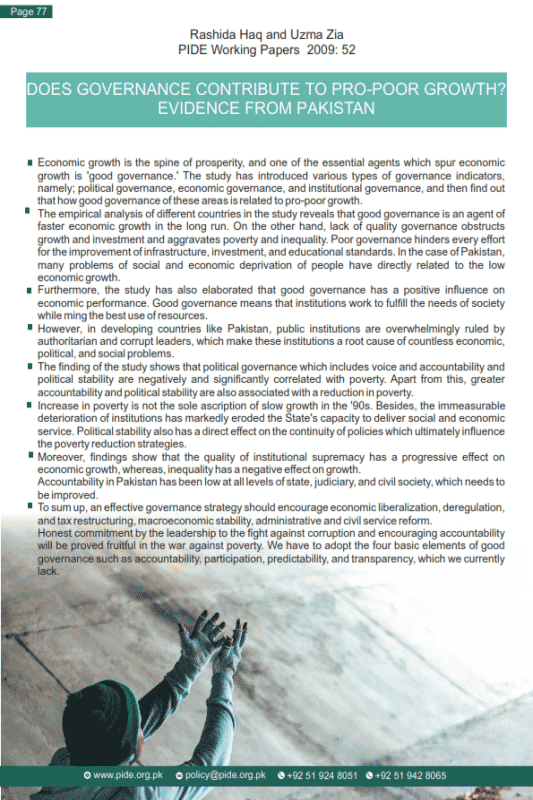DOES GOVERNANCE CONTRIBUTE TO PRO-POOR GROWTH? EVIDENCE FROM PAKISTAN
Publication Year : 2020
- Economic growth is the spine of prosperity, and one of the essential agents which spur economic growth is ‘good governance.’ The study has introduced various types of governance indicators, namely; political governance, economic governance, and institutional governance, and then find out that how good governance of these areas is related to pro-poor growth.
- The empirical analysis of different countries in the study reveals that good governance is an agent of faster economic growth in the long run. On the other hand, lack of quality governance obstructs growth and investment and aggravates poverty and inequality. Poor governance hinders every effort for the improvement of infrastructure, investment, and educational standards. In the case of Pakistan, many problems of social and economic deprivation of people have directly related to the low economic growth.
- Furthermore, the study has also elaborated that good governance has a positive influence on economic performance. Good governance means that institutions work to fulfill the needs of society while ming the best use of resources.
- However, in developing countries like Pakistan, public institutions are overwhelmingly ruled by authoritarian and corrupt leaders, which make these institutions a root cause of countless economic, political, and social problems.
- The finding of the study shows that political governance which includes voice and accountability and political stability are negatively and significantly correlated with poverty. Apart from this, greater accountability and political stability are also associated with a reduction in poverty.
- Increase in poverty is not the sole ascription of slow growth in the ’90s. Besides, the immeasurable deterioration of institutions has markedly eroded the State’s capacity to deliver social and economic service. Political stability also has a direct effect on the continuity of policies which ultimately influence the poverty reduction strategies.
- Moreover, findings show that the quality of institutional supremacy has a progressive effect on economic growth, whereas, inequality has a negative effect on growth. Accountability in Pakistan has been low at all levels of state, judiciary, and civil society, which needs to be improved.
- To sum up, an effective governance strategy should encourage economic liberalization, deregulation, and tax restructuring, macroeconomic stability, administrative and civil service reform. Honest commitment by the leadership to the fight against corruption and encouraging accountability will be proved fruitful in the war against poverty. We have to adopt the four basic elements of good governance such as accountability, participation, predictability, and transparency, which we currently lack.
Entrepreneurship in Pakistan
- This paper is focused on the subject of entrepreneurship in Pakistan and how policy and the environment can be adjusted to allow entrepreneurship to play a more significant role in the economy of Pakistan.
- Moreover, it aims to provide a general understanding of entrepreneurship. Furthermore, this paper also argues that economic growth and progress with poverty reduction have both been seriously impeded because of a policy environment that is unfriendly to entrepreneurship.
- This paper presents an analysis of the state of entrepreneurship/rent-seeking to prevail in Pakistan. This analysis allows us to obtain an understanding of the kinds of reforms (including legislative changes) that are required to develop entrepreneurship.The author defines that entrepreneurship is a combination of innovation and risk-taking. When such activity thrives, high growth rates are achieved as well as opportunities offered to all segments of society, including the poor.
- In Pakistan, innovation and risk-taking are severely inhibited by the intrusive role of government in the marketplace. From the early days of planning when protection and subsidy policies determined winners in the market place, entrepreneurship has been diverted to seeking government favours. Government economic policy also seeks to promote growth through a basically ‘mercantilist’ approach where domestic commerce through seriously neglect is heavily regulated. This sector either employs most of the poor or offers them entrepreneurial opportunities. Hence deregulating this sector could be a priority in and anti-poor strategy.
- The paper also argues that land distribution and city zoning and management have also evolved to further reinforce the prevalent rent-seeking path to success. The result is that cities are by design not allowed to become clusters of commerce that will be entrepreneur-friendly. These clusters of dense urban commerce are magnets of employment and opportunity for the poor. To develop an entrepreneurship culture in the country, the system of incentives (laws and policies) that promote rent-seeking will have to be dismantled.
- Recommendations of the paper If entrepreneurship is to develop and be at the root of development in the country, it is imperative that there must be deep government reform that limits rent-seeking, encourages innovation, and fosters enterprise. The following is recommended: (a) Reinventing the Role of Government and Ensuring Rule of Law (b) Removing the Instruments of Rent-seeking (c) The author has a firm belief that there is an urgent need to shift the growth paradigm in Pakistan. (d) The author notes that “Cities grow when they are allowed to function as decentralized, coherent administrative units that are run for the advancement of commerce. It is then that they are engines of economic, cultural and human growth.”
© 2024 Pakistan Institute of Development Economics




